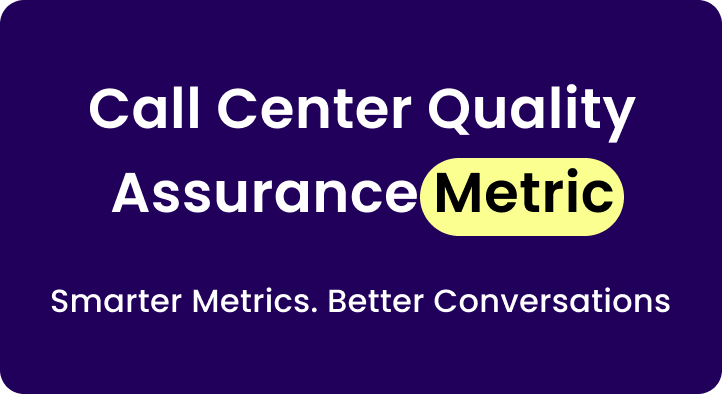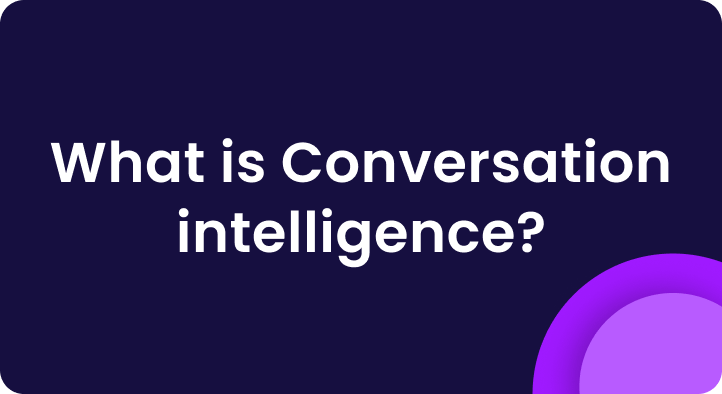If you’re part of the call center industry by any means, you’re well aware that managing a call center is no small feat.
The complexities of ensuring that every customer has a seamless experience while balancing agent performance, team morale, and technology can overwhelm even the most experienced managers.
If you’re struggling with call center management, you’re not alone.
According to PwC, “1 in 3 customers will leave a brand they love after just one bad experience, and 92% would abandon a company after two or three negative interactions.”
That statistic makes it clear that your call center is the frontline of your brand’s reputation.
Yet, ensuring a high level of customer service while keeping agents productive is no easy task.
So, what’s the solution?
Effective call center management can help you tackle these challenges head-on.
In this article, we’ll cover the essential aspects of call center management, explore common challenges, and discuss actionable strategies to improve performance, including how tools like conversation intelligence and speech analytics can play a crucial role.
Let’s dive in!
A. What is call center management?
In a nutshell, call center management is how you run your center’s daily operations.
As a manager, your role is to keep track of what happens across different channels and to mobilize your team as efficiently as possible to meet sales and customer experience goals.
Your manager’s core responsibilities include the following:
- Recruiting, hiring, and training agents who can handle customer interactions professionally and efficiently.
- Using metrics and Key Performance Indicators (KPIs) to assess your agents’ performance, the quality of calls, and overall customer satisfaction.
- Implementing and maintaining software and tools to streamline operations.
- Continuously reviewing and refining the call center processes to make things work better.
- Improving customers’ experience to build loyalty and satisfaction.
- Adhering to industry regulations and maintaining high service quality standards.
- Making sure you have the right number of agents available to handle customer inquiries.
All these tasks contribute to your call center’s success.
It’s a challenging role, but how you handle these daily operations can significantly impact your team’s performance and overall customer satisfaction.
Enthu.AI Tip: Avoid old-school methods and leverage AI-powered call center management software like Enthu.AI to manage your call center smartly. From call transcription to agent coaching, quality assurance, and call monitoring, Enthu.AI’s variety of advanced features enable you to manage your call center better than before.
B. Different call center roles
Effective management of a call center depends on teamwork among various roles.
Each position plays a critical part in ensuring smooth operations and great customer service.
Here’s a breakdown of some key roles in a well-structured call center team:
1. Call center manager
What They Do: As the call center manager, you oversee the overall operations and link the call center and the broader customer service team. You set performance expectations for employees, establish goals, and handle strategic planning for the call center.
Key Responsibilities:
- Recruitment and training: You’re responsible for hiring and training the call center staff.
- Monitoring operations: Regularly track key performance indicators (KPIs) like call wait times and customer satisfaction scores.
- Enhancing customer experience: Develop strategies to improve customer interactions and manage complaints effectively.
- Budget management: Control costs and ensure resources are used efficiently.
- Training and mentoring: Provide ongoing training and coaching to your team.
2. Call center supervisor
What They Do: Also known as team leads, call center supervisors have a direct connection to agents and daily operations. They manage agent activities and are well-versed in products and services, stepping in when customer issues need escalation.
Key Responsibilities:
- Conflict resolution: Address issues or conflicts within the team and promote a positive work environment.
- Performance evaluations: Conduct regular evaluations and offer feedback to help agents improve.
- Quality assurance: Ensure all customer interactions meet quality standards and comply with company policies.
- Scheduling: Create schedules and manage shift changes to maintain adequate coverage.
- Handling escalations: Deal with escalated calls from customers who have complex issues or are dissatisfied with service.
3. Call center agent/representative
What They Do: Call center agents are the frontline workers who interact directly with customers. They handle inquiries, provide support, and sometimes conduct outbound calls for sales or market research. Agents may specialize in different areas, such as technical support or customer service.
Key Responsibilities:
- Managing calls: Handle both inbound and outbound calls professionally, always maintaining a positive attitude.
- Providing information: Offer accurate details about products, services, and company policies to customers.
- Customer engagement: Ensure customers feel heard and valued during every interaction.
- Updating records: Keep customer information accurate in the company database during or after calls.
- Following guidelines: Adhere to company scripts and procedures to ensure consistent quality in customer service.
Enthu.AI Tip: To enhance the effectiveness of your call center team, leverage Enthu.AI’s AI-driven tools tailored for each role. For managers, the software provides valuable insights through advanced analytics to track KPIs and agent performance. Supervisors can benefit from real-time coaching and feedback mechanisms to support agents in handling escalated calls. Agents can quickly access information quickly using Enthu.AI’s call transcription and knowledge base features.
C. Common Challenges in Call Center Management
Managing a call center can be a complex and demanding task, particularly in today’s fast-paced business environment.
As customer expectations rise and technology evolves, call center managers face a range of challenges that can impact overall performance and satisfaction.
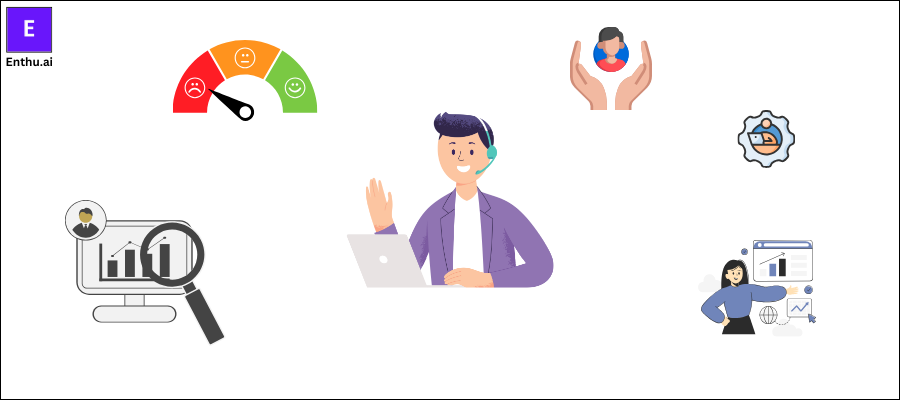
Here are five common challenges encountered in call center management:
1. Poor customer satisfaction
Maintaining high customer satisfaction is a constant challenge, as customers expect prompt and efficient service.
Any delays or lack of personalization can lead to dissatisfaction, making it crucial for managers to ensure their teams deliver an exceptional customer experience consistently.
2. Agent retention
High turnover rates among contact center agents pose a significant challenge, as they exceed the national average.
Frequent departures disrupt operations, lead to increased recruitment and training costs, and can impact team morale and performance, making it essential for managers to focus on retention strategies.
3. Keeping up with technology

The fast-paced evolution of technology can overwhelm call center managers, who must continually adapt to new tools and systems.
Integrating advanced solutions can improve call center efficiency but also requires ongoing training and support, posing a challenge in effectively leveraging technology for optimal performance.
4. Remote work management
Managing remote or hybrid teams adds complexity to call center operations.
Without face-to-face interaction, providing effective coaching, monitoring performance, and maintaining engagement can be challenging, requiring managers to find innovative ways to connect with their teams virtually.
5. Tracking accurate data
Call centers generate vast amounts of data from customer interactions, making it difficult to track and analyze effectively.
Ensuring data accuracy is crucial for informed decision-making; however, the sheer volume can lead to oversight, resulting in potentially misguided strategies and operational inefficiencies.
D. Best practices and strategies for effective call center management
Managing a call center effectively requires a strategic approach encompassing various operations aspects.
Here are some best practices and strategies to enhance your call center management, ensuring you deliver exceptional service while keeping your team engaged and motivated.
1. Start with hiring and retaining best staff
The foundation of a successful call center lies in its people.
Begin with a clear and honest job description that outlines what you expect from your agents.
This transparency helps avoid confusion and sets the stage for success.
If candidates understand the role fully, it can save you time and resources in training those who might not be a good fit.
Once you’ve hired the right people, focus on keeping them engaged.
Are you checking in with your team daily? Do you encourage connections among team members?
Regular check-ins and team-building activities can create a sense of belonging and boost morale.
If your team feels valued and supported, they are more likely to stay, which reduces turnover.
Be aware of common reasons agents leave, such as inflexible work hours, repetitive tasks, low pay, customer abuse, and burnout.
Address these challenges with a clear plan.
By fostering a positive work environment and empowering your agents, you can enhance their experience and keep them motivated.
2. Leverage AI-powered call center software
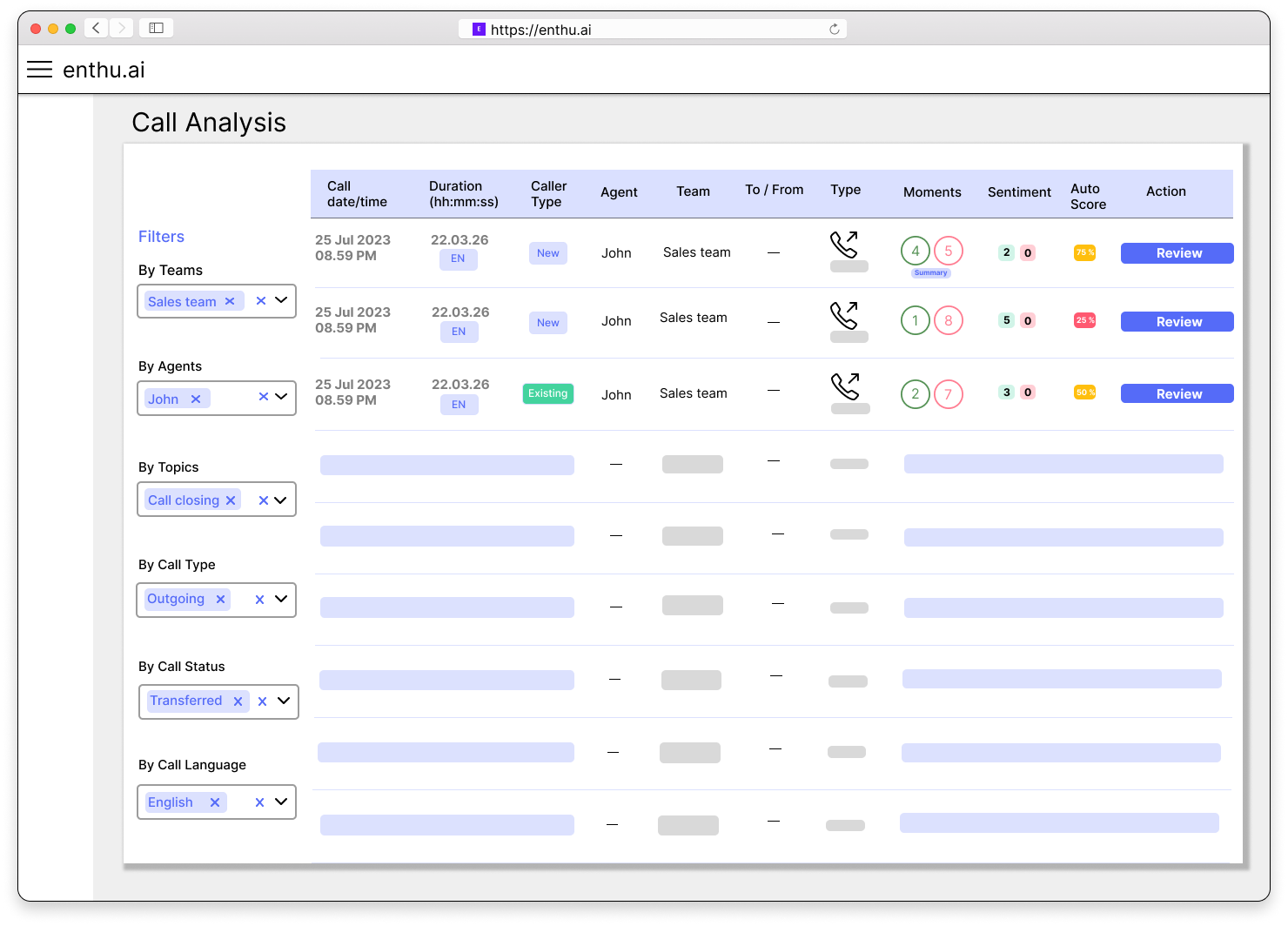
Call centers have always been at the forefront of technology, constantly looking for ways to enhance operations and improve customer interactions.
The Global Call Center AI Market is projected to reach approximately USD 13.6 billion by 2033, up from USD 1.8 billion in 2023, growing at a CAGR of 22.4% from 2024 to 2033.
Today, AI-powered call center software offers innovative solutions that can significantly transform how call centers manage their operations.
Here’s how leveraging AI can lead to effective call center management:
- Streamlined call routing: AI quickly analyzes incoming calls to connect customers with the most suitable agent based on their needs. This reduces wait times and minimizes the hassle of multiple transfers.
- Instant call analytics: AI-powered software provides real-time insights into customer interactions, revealing sentiment and preferences. This helps supervisors make informed decisions to improve service quality.
- Enhanced understanding of customer behavior: AI gathers detailed data on customer interactions, allowing agents to better anticipate needs. This personalized approach leads to higher customer satisfaction and loyalty.
- Real-time assistance for agents: AI tools offer real-time suggestions during calls, helping agents find answers quickly. This support reduces agent stress and ensures customers receive accurate information promptly.
- Empowering self-service options: AI enables customers to resolve simple inquiries independently, freeing agents to handle more complex issues. This enhances efficiency and improves the overall customer experience.
- Continuous improvement through data insights: AI monitors performance metrics to identify areas for improvement in call center operations. Ongoing data analysis helps refine strategies and align them with agent and customer expectations.
3. Invest in agent training and coaching

Effective call center management hinges on continuous agent training and support.
With 80% of consumers expecting assistance, training should be an ongoing practice rather than a one-time event.
Utilize various formats like videos, text, and quizzes to cater to different learning styles. Invest in comprehensive coaching for both new hires and experienced agents to clarify what “excellent service” entails.
Leverage quality assurance (QA) software to gain insights into agent performance and identify knowledge gaps, providing targeted feedback and additional training as needed.
Implement targeted coaching plans to help agents improve and work independently.
Tools like Enthu.AI can streamline training processes, enhancing overall productivity.
Investing in your agents’ growth fosters an environment where they feel valued, ultimately boosting customer satisfaction and loyalty.
4. Schedule agents effectively with workforce management tools
Effective scheduling of agents is crucial for optimizing call center operations.
Utilizing workforce management tools can help create balanced schedules that align with peak call times, ensuring adequate coverage and minimizing wait times.
These tools analyze historical call data and forecast demand, enabling managers to allocate resources efficiently.
Implementing flexible scheduling allows agents to express their availability, fostering job satisfaction and reducing burnout.
Regularly reviewing and adjusting schedules based on real-time data can further enhance performance, ensuring that agents are available when customers need them most, ultimately improving service quality and customer satisfaction.
5. Perform regular quality assurance checks
Did you know that 86% of customers are willing to pay more for a better customer experience?
Regular quality assurance (QA) results in better service, happier customers, and a more efficient call center operation.
By monitoring calls, managers can identify areas of excellence and pinpoint where improvement is needed, helping agents meet customer expectations.
Ongoing evaluations create a standard of excellence, ensuring all agents are trained to provide the best possible experience.
Additionally, QA checks reveal valuable insights into customer interactions, allowing management to address common issues and trends.
This leads to enhanced training programs and improved service quality.
6. Collect customer feedback
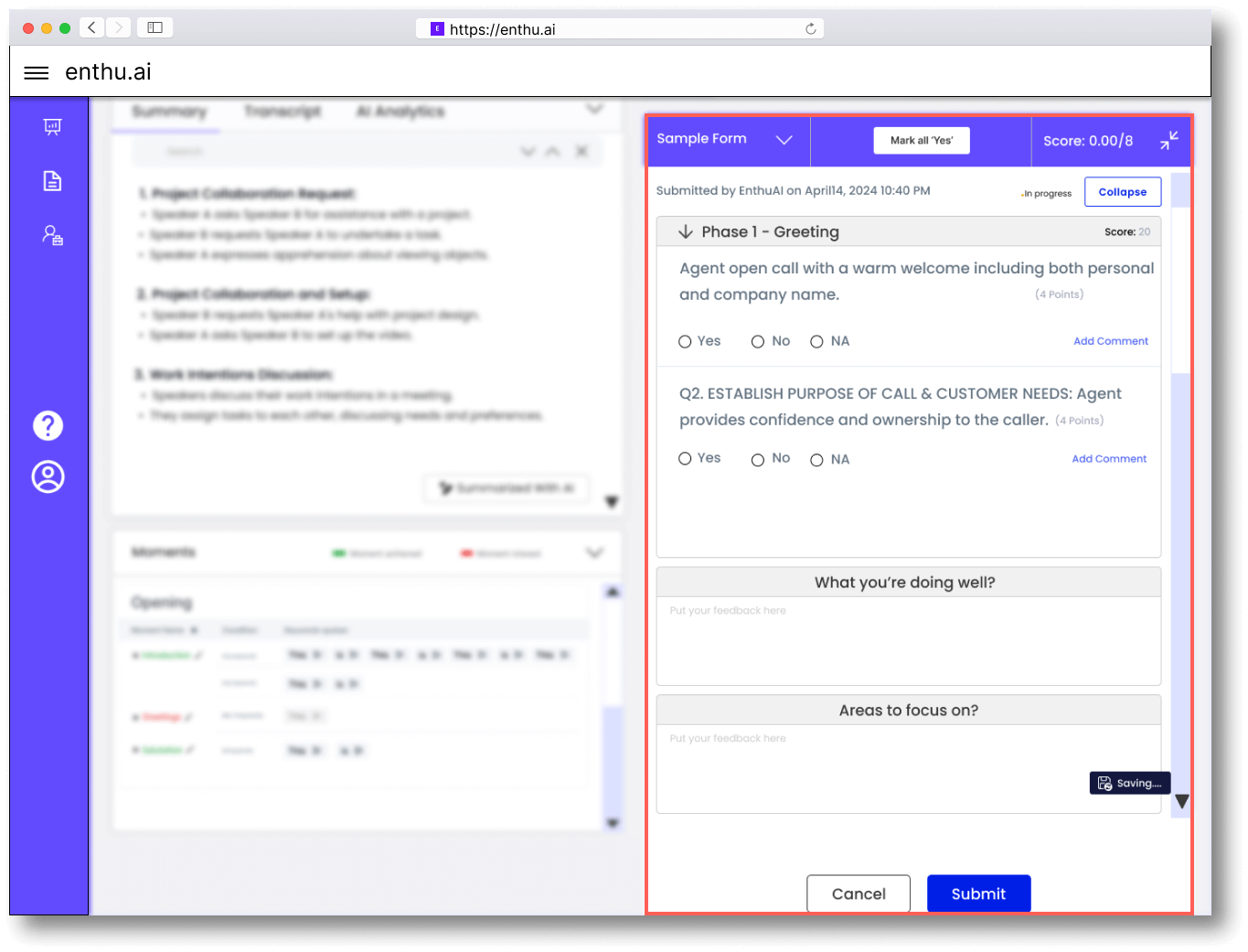
Call centers can gauge customer satisfaction and identify potential issues by proactively seeking feedback after each support interaction—through surveys, for example.
Frequent complaints may highlight the need for better agent training or signal underlying problems with products or services.
Using advanced call center software that facilitates survey distribution and data collection allows for efficient analysis of customer sentiments.
For instance, Enthu’s built-in evaluation module enables managers to rate calls, provide instant feedback, and share notes with agents.
Moreover, creating custom evaluation forms helps tailor feedback to specific team needs, making coaching sessions more effective.
Comprehensive call filtering across various metrics—such as date, agent, or call type—enables testing QA hypotheses, further refining service quality.
Enthu.AI Tip: Enhance call center management by integrating Enthu.AI’s advanced features for streamlined call routing, agent training, real-time performance analytics, and efficient customer feedback collection.
Additional tips for effective contact center management
- Setup a cohesive plan
- Outline your goals
- Analyze call center data
- Make your call center omnichannel
- Leverage call routing
- Incentivize performance
- Track employee satisfaction or employee net promoter score (eNPS)
E. Improve your call center management with Enthu.AI
Are you ready to transform your call center into a powerhouse of efficiency and customer satisfaction?
With Enthu.AI, you can streamline your operations and enhance agent performance like never before.
Key Benefits:
- Comprehensive call monitoring: Get 100% coverage of all calls, ensuring that no conversation slips through the cracks. Our advanced speech-to-text technology accurately transcribes calls across various English dialects, allowing you to focus on key moments without listening to every second of each call.
- Automated quality assurance: Say goodbye to tedious evaluations. Enthu.AI automates quality monitoring, helping you identify patterns and agent performance effortlessly. Use our exhaustive filtering options to analyze calls by date, agent, or call type, and generate valuable insights for continuous improvement.
- Real-time coaching: Transform your agents into sales rockstars by providing timely coaching based on data-driven insights. With Enthu.AI, you can evaluate performance, pinpoint areas for growth, and empower your team to excel.
- Actionable insights for all teams: Leverage customer intelligence to benefit your sales, support, and marketing teams. The data collected can help uncover revenue opportunities and improve overall customer experience with built-in PII Redaction ensuring that sensitive details remain confidential.
- Easy setup and integration: Get started quickly—Enthu.AI can be integrated into your existing systems in days, not months. Plus, our flexible platform requires no annual commitment, allowing you to scale as needed.
By harnessing the power of Enthu.AI, you not only boost agent performance but also improve customer satisfaction and retention.
Conclusion
Call center management is an ongoing balancing act.
You’re responsible for ensuring high levels of customer service while maintaining agent morale and keeping operational efficiency in check.
By using the right strategies and leveraging technology like speech analytics, call monitoring, and quality assurance, you can create a call center that excels in both performance and customer satisfaction.
With the right approach, your call center can go from being a cost center to a profit center, driving customer loyalty and business growth.
FAQs
1. How are call centers managed?
Call centers are managed through a combination of performance monitoring, staffing, training, and technology integration. Effective management ensures agents meet key performance indicators (KPIs) and deliver high-quality customer service.
2. How to manage a successful call center?
To manage a successful call center, focus on clear communication, regular training, and using the right technology. Implementing effective processes and continuous feedback helps enhance agent performance and customer satisfaction.
3. What are the objectives of call center management?
The main objectives of call center management are to optimize operational efficiency, improve customer satisfaction, and enhance agent performance. Additionally, managers aim to reduce costs while maintaining high service quality.
4. What is call center management?
Call center management involves overseeing operations, optimizing processes, and managing staff to ensure efficient handling of customer interactions. It includes agent training, monitoring, quality assurance, and ensuring CSAT.
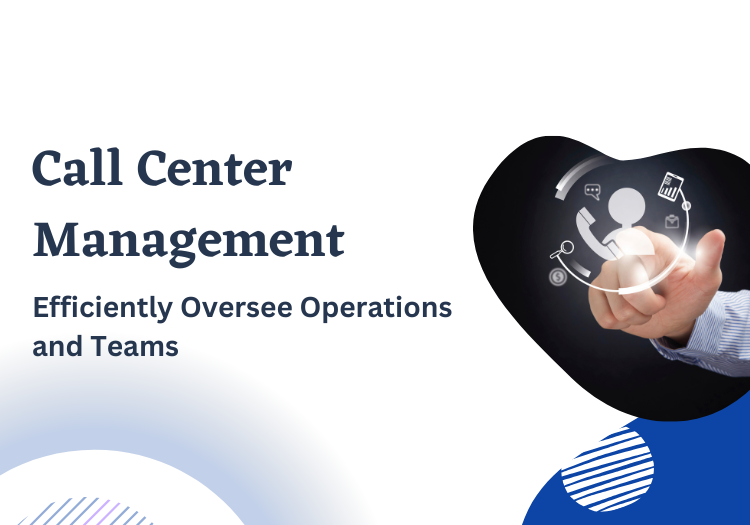



 On this page
On this page